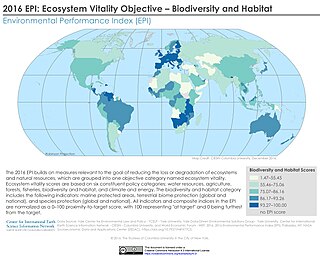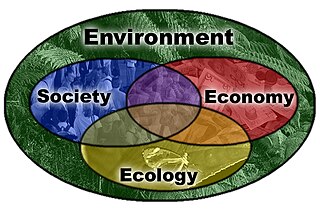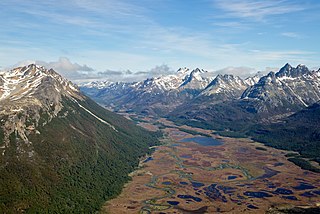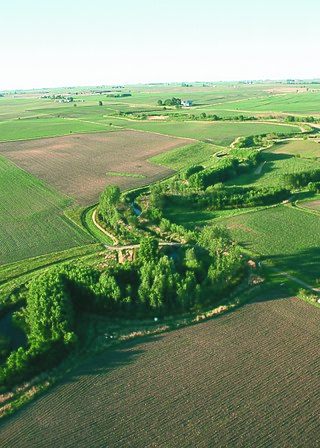
Deforestation or forest clearance is the removal and destruction of a forest or stand of trees from land that is then converted to non-forest use. Deforestation can involve conversion of forest land to farms, ranches, or urban use. About 31% of Earth's land surface is covered by forests at present. This is one-third less than the forest cover before the expansion of agriculture, with half of that loss occurring in the last century. Between 15 million to 18 million hectares of forest, an area the size of Bangladesh, are destroyed every year. On average 2,400 trees are cut down each minute. Estimates vary widely as to the extent of deforestation in the tropics. In 2019, nearly a third of the overall tree cover loss, or 3.8 million hectares, occurred within humid tropical primary forests. These are areas of mature rainforest that are especially important for biodiversity and carbon storage.

Biodiversity is the variability of life on Earth. It can be measured on various levels. There is for example genetic variability, species diversity, ecosystem diversity and phylogenetic diversity. Diversity is not distributed evenly on Earth. It is greater in the tropics as a result of the warm climate and high primary productivity in the region near the equator. Tropical forest ecosystems cover less than one-fifth of Earth's terrestrial area and contain about 50% of the world's species. There are latitudinal gradients in species diversity for both marine and terrestrial taxa.

Palm oil is an edible vegetable oil derived from the mesocarp of the fruit of oil palms. The oil is used in food manufacturing, in beauty products, and as biofuel. Palm oil accounted for about 36% of global oils produced from oil crops in 2014. Palm oils are easier to stabilize and maintain quality of flavor and consistency in ultra-processed foods, so they are frequently favored by food manufacturers. Globally, humans consumed an average of 7.7 kg (17 lb) of palm oil per person in 2015. Demand has also increased for other uses, such as cosmetics and biofuels, encouraging the growth of palm oil plantations in tropical countries.

Conservation biology is the study of the conservation of nature and of Earth's biodiversity with the aim of protecting species, their habitats, and ecosystems from excessive rates of extinction and the erosion of biotic interactions. It is an interdisciplinary subject drawing on natural and social sciences, and the practice of natural resource management.
An ecological or environmental crisis occurs when changes to the environment of a species or population destabilizes its continued survival. Some of the important causes include:
Coextinction and cothreatened refer to the phenomenon of the loss or decline of a host species resulting in the loss or endangerment of another species that depends on it, potentially leading to cascading effects across trophic levels. The term was originated by the authors Stork and Lyal (1993) and was originally used to explain the extinction of parasitic insects following the loss of their specific hosts. The term is now used to describe the loss of any interacting species, including competition with their counterpart, and specialist herbivores with their food source. Coextinction is especially common when a keystone species goes extinct.

Human impact on the environment refers to changes to biophysical environments and to ecosystems, biodiversity, and natural resources caused directly or indirectly by humans. Modifying the environment to fit the needs of society is causing severe effects including global warming, environmental degradation, mass extinction and biodiversity loss, ecological crisis, and ecological collapse. Some human activities that cause damage to the environment on a global scale include population growth, neoliberal economic policies and rapid economic growth, overconsumption, overexploitation, pollution, and deforestation. Some of the problems, including global warming and biodiversity loss, have been proposed as representing catastrophic risks to the survival of the human species.

Reconciliation ecology is the branch of ecology which studies ways to encourage biodiversity in the human-dominated ecosystems of the anthropocene era. Michael Rosenzweig first articulated the concept in his book Win-Win Ecology, based on the theory that there is not enough area for all of earth's biodiversity to be saved within designated nature preserves. Therefore, humans should increase biodiversity in human-dominated landscapes. By managing for biodiversity in ways that do not decrease human utility of the system, it is a "win-win" situation for both human use and native biodiversity. The science is based in the ecological foundation of human land-use trends and species-area relationships. It has many benefits beyond protection of biodiversity, and there are numerous examples of it around the globe. Aspects of reconciliation ecology can already be found in management legislation, but there are challenges in both public acceptance and ecological success of reconciliation attempts.

Environmental vegetarianism is the practice of vegetarianism that is motivated by the desire to create a sustainable diet, which avoids the negative environmental impact of meat production. Livestock as a whole is estimated to be responsible for around 15% of global greenhouse gas emissions. As a result, significant reduction in meat consumption has been advocated by, among others, the Intergovernmental Panel on Climate Change in their 2019 special report and as part of the 2017 World Scientists' Warning to Humanity.

Computational sustainability is an emerging field that attempts to balance societal, economic, and environmental resources for the future well-being of humanity using methods from mathematics, computer science, and information science fields. Sustainability in this context refers to the world's ability to sustain biological, social, and environmental systems in the long term. Using the power of computers to process large quantities of information, decision making algorithms allocate resources based on real-time information. Applications advanced by this field are widespread across various areas. For example, artificial intelligence and machine learning techniques are created to promote long-term biodiversity conservation and species protection. Smart grids implement renewable resources and storage capabilities to control the production and expenditure of energy. Intelligent transportation system technologies can analyze road conditions and relay information to drivers so they can make smarter, more environmentally-beneficial decisions based on real-time traffic information.

Environmental issues are disruptions in the usual function of ecosystems. Further, these issues can be caused by humans or they can be natural. These issues are considered serious when the ecosystem cannot recover in the present situation, and catastrophic if the ecosystem is projected to certainly collapse.

Palm oil, produced from the oil palm, is a basic source of income for many farmers in South East Asia, Central and West Africa, and Central America. It is locally used as cooking oil, exported for use in much commercial food and personal care products and is converted into biofuel. It produces up to 10 times more oil per unit area than soybeans, rapeseed or sunflowers.

The Roundtable on Sustainable Palm Oil (RSPO) was established in 2004 with the objective of promoting the growth and use of sustainable palm oil products through global standards and multistakeholder governance. The seat of the association is in Zürich, Switzerland, while the secretariat is currently based in Kuala Lumpur, with a satellite office in Jakarta. RSPO currently has 5,650 members from 94 countries.

A peatland is a type of wetland whose soils consist of organic matter from decaying plants, forming layers of peat. Peatlands arise because of incomplete decomposition of organic matter, usually litter from vegetation, due to water-logging and subsequent anoxia. Peatlands are unusual landforms that derive mostly from biological rather than physical processes, and can take on characteristic shapes and surface patterning.

William F. Laurance, also known as Bill Laurance, is Distinguished Research Professor at James Cook University, Australia and has been elected as a Fellow of the Australian Academy of Science. He has received an Australian Laureate Fellowship from the Australian Research Council. He held the Prince Bernhard Chair for International Nature Conservation at Utrecht University, Netherlands from 2010 to 2014.

Conservation Drones is a conservation organization co-founded by Lian Pin Koh and Serge Wich to make and promote the use of unmanned aerial vehicles (UAVs) for biodiversity conservation applications. The Conservation Drone project shares their experiences of UAV building and using low cost UAVs. This Project has grown to become a worldwide initiative to raise awareness of conservation challenges in certain regions, and inspire others to adopt emerging technologies for conservation.

Nature-based solutions describe the development and use of nature (biodiversity) and natural processes to address diverse socio-environmental issues. These issues include climate change mitigation and adaptation, human security issues such as water security and food security, and disaster risk reduction. The aim is that resilient ecosystems provide solutions for the benefit of both societies and biodiversity. The 2019 UN Climate Action Summit highlighted nature-based solutions as an effective method to combat climate change. For example, nature-based systems for climate change adaptation can include natural flood management, restoring natural coastal defences, and providing local cooling.

Biodiversity loss happens when plant or animal species disappear completely from Earth (extinction) or when there is a decrease or disappearance of species in a specific area. Biodiversity loss means that there is a reduction in biological diversity in a given area. The decrease can be temporary or permanent. It is temporary if the damage that led to the loss is reversible in time, for example through ecological restoration. If this is not possible, then the decrease is permanent. The cause of most of the biodiversity loss is, generally speaking, human activities that push the planetary boundaries too far. These activities include habitat destruction and land use intensification. Further problem areas are air and water pollution, over-exploitation, invasive species and climate change.
Agricultural expansion describes the growth of agricultural land especially in the 20th and 21st centuries.

Thomas Ward Crowther is a British ecologist. He is a former professor of ecology at ETH Zürich and a founding co-chair of the Advisory Board for the United Nations Decade on Ecosystem Restoration. At ETH Zürich, he started Crowther Lab, an interdisciplinary group of scientists exploring the role of biodiversity in regulating the Earth's climate.

















